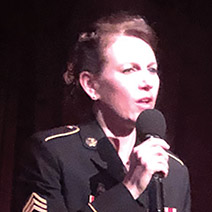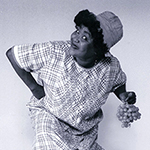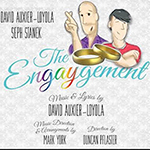Alexis Cole
Canary in Combat Boots
The Beach Café, NYC, April 6, 2019
Reviewed by Alix Cohen for Cabaret Scenes

“How Long Has This Been Going On?” Alexis Cole croons as pianist Tedd Firth inimitably textures. (George Gershwin/Ira Gershwin). “That was the first song I sang with The West Point Nine in 2009.” “So you sang with the band?,” people ask. “No. I was in the Army.” Having protested the war and the man, I had a chance to be a government-sponsored jazz singer. Was this the right fit?”
On the 10-year anniversary of her seven-year journey, Cole looks back with pride, humor, and WWII songs. “I can’t say why I didn’t do any research on basic training.
I might’ve been psyched out, of course.” The performer took an oath of enlistment, then a train, a plane, and a bus to Ft. Leonard Wood in Missouri. Recruits were screamed at the minute they hit the ground (“shark attack”) and made to hold duffle bags over their heads. Cole dons a camouflage jacket and hoists a bag to demonstrate. Ouch.
While waiting in an auditorium, someone encouraged her to use the piano. Cole sang Jimmy Van Heusen/Johnny Mercer’s “I Thought About You.” Here’s the jazz baby—mid tempo bounce, creative kneading of notes, eyes-closed scat. “That was Basic Training light.”
Following a tutorial on army acronyms, “G.I. Jive” (Johnny Mercer) arrives as if still in the 1940s; notes slip/slide, phrasing is just right, cutting and elongating period perfect. Firth boogies. “Chuck all your junk/Back in the trunk/Fall on your bunk/Clunk!”
“Basic training is relentless,” Cole begins, regaling us with a “highlights reel” of what they had to go through with little sleep and seven-minute meals. It’s exhausting just listening. While standing in position at least an hour and a half a day, the musician found herself meditating. Running with a 30-pound pack, she says “I thought I was going to die.” She nonetheless found beauty in a moon. “Some days I thought I could shoot someone, others I would cry at a sunset.” The physical and emotional stress were extraordinary.
During that early part of her service, Cole wrote regular letters to someone who maintained an online blog for her. “I put my address on every post. People sent me mail as well as artwork and poems. I really needed to be nourished.” Cards and letters from that trove are passed around the audience—“I really think you should write a book about our unique perspective as a jazz musician.” “What training you’re going through! Inland where we live, it’s so peaceful.” “Well, you’ve been living through hell, but I believe you’re strong and brave.” They’re amazingly personal, filled with day-to-day details, as if written to a friend or relative.
Rodgers and Hammerstein’s “I Cain’t Say No” from Oklahoma!—“the Hamilton of 1943”—is offered to illustrate feelings of becoming completely defeminized: “I was covered with grease. My nails were broken, I had a unibrow” Draping a red feather boa over her shoulders, Cole delivers a completely original take on “I Cain’t Say No.” David Fink’s bass both accompanies and somehow comments. Despite dropped gs, the now slowed song becomes sophisticated.
Guest Heidi Clark sings a spare, pretty “It’s Been a Long Long Time” (Jule Styne/Sammy Cahn). Two of the three New York Nightingales— Jennifer Mergele and Lena Dabrusin— offered the familiar harmony of “Boogie Woogie Bugle Boy (of Company B)” with Clark filling in for the third and not, alas, quite blending.
New to me, Gene Sheer’s “American Anthem,” sung in Cole’s last performance in the army, is as patriotic as it gets: “Let them say of me/I was one who believed/In sharing the blessings I received/Let me know in my heart/When days are through/America, America I gave my best to you.” Bass is bowed. The vocalist is respectful, still, solemn. It’s easy to imagine the crowd palpably stirred.
At a party celebrating the end of her service, Cole came up with a wonderfully pagan ceremony. We close with “Over the Rainbow” (Harold Arlen/Yip Harburg) “which speaks to the lyricism for which America is searching.” I’ve heard this song dozens and dozens of times.
Tonight it acquires a different context.
Her patter could successfully be briefer and more polished. Cole might take intimate songs down a little. This is, however, an original show with beloved songs; it’s illuminating and sincere.





